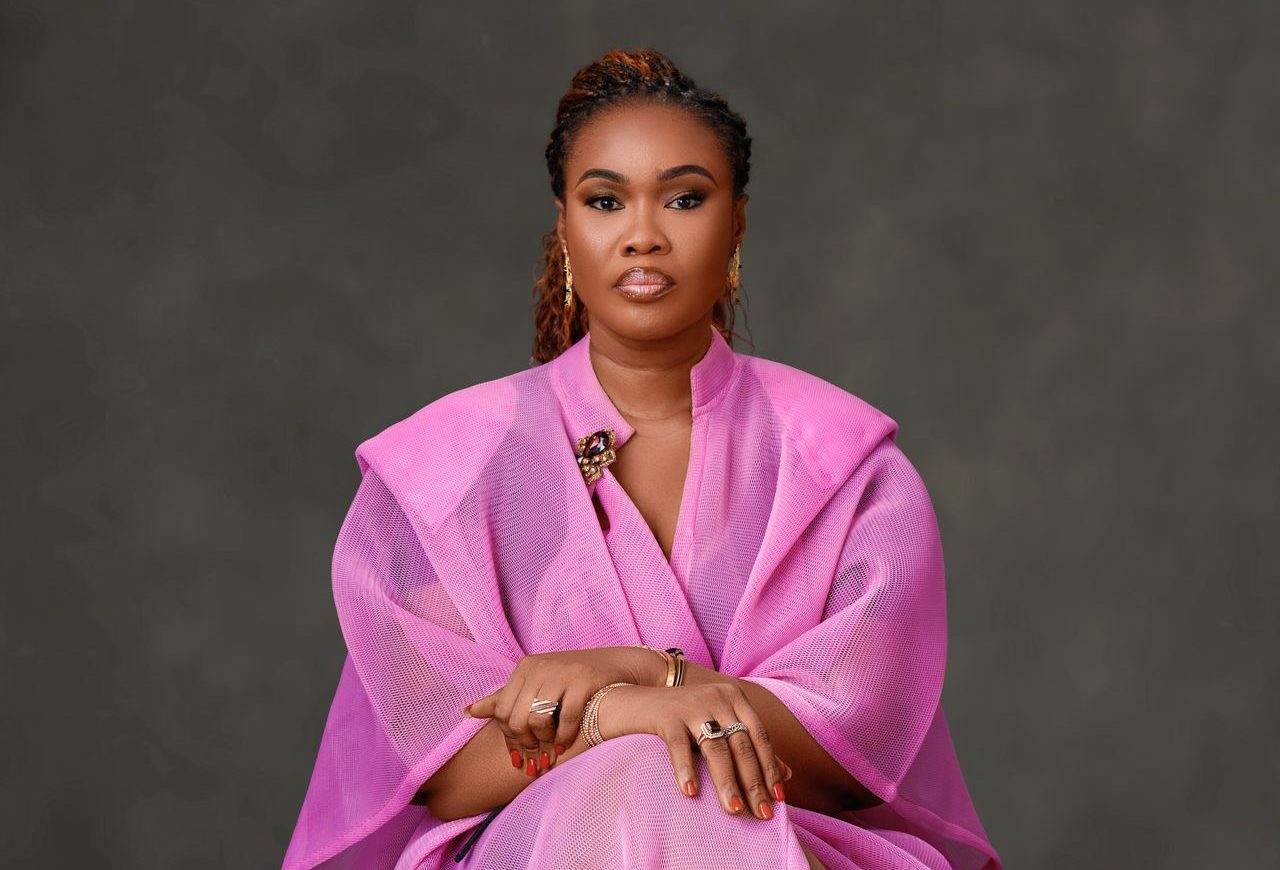Afripreneur
Up Close & Personal with Phillip Scott, Founder of YouTube’s Most Watched Black News Channel

Phillip Scott, Founder at The African Diaspora News Network (Source: Kellen Coleman)
Kellen: You started YouTube as a hobby and for free for years while having a job and a family. Did you ever imagine it would have blossomed into being what you have now?
Phillip: No, it wasn’t in my mind that our platform would grow into what you see today. I knew we would grow if I would be open to new ideas but not at this level.
Kellen: Numbers show you are the most subscribed to Black News network on YouTube, does YouTube give you any special privileges or awards?
Phillip: We have received a Silver Play Button award for obtaining 100K subscribers and a Gold Play Button award for obtaining 1M subscribers. Anyone that hit those levels of subscribers can obtain those awards. But an award directed at being a successful Black platform. No, I haven’t had that type of recognition.
Kellen: With your new app and website it appears your messages are more direct and uncensored did you feel you were being silenced on other social media platforms?
Phillip: Social media platforms aren’t what they used to be. Back when I started as long as you didn’t use racial slurs, post violence or do something bad to children, you were fine online. Today social media companies are heavily censored and at the end of the day it’s their platforms. I felt we need our own place to speak where no one can remove our opinions.
Kellen: It’s said your content can be seen on various networks including Roku, Itunes, and others around the world, how do you keep track?
Phillip: We try to keep up by checking our various networks for the analytics just to get a scope of what countries and demographics are consuming our content.
Kellen: Why do you think your channel is so successful, and what do you do that others aren’t?
Phillip: I believe our success comes from taking many risks. Some people aren’t willing to invest money or risk failing. I also believe our success comes from having the proper team as well. As you grow your team is very important in helping you achieve the goals at hand. We also made sure to dedicate to a daily show and being at the same level as mainstream media platforms.
Kellen: African based news networks struggle to get the audience you have, what advice would you have for them and would you consider partnering?
Phillip: I would say for African channels to target a younger audience. The African continent average age is 25. Younger people are more on smartphones and care about modern Africa. Young African people care about foreign nations taking the resources for free, they care about their politics and want to live no different than the rest of the world. You can’t get a young African audience focusing on what the older generation cares about.
Kellen: You have come a long way from filming in the bathroom and kitchen table, you have a beautiful studio setup would you encourage others to invest in their studio?
Phillip: I always say that no one will invest in you until you invest in yourself first. Always be willing to take a risk by investing your time, money and partnering with others. I felt that having a studio similar to what you will see on television would bring our platform respect. I have achieved the respect due to our reporting and efforts.
Kellen: How has your message been received by Africans in the states and Africans on the continent?
Phillip: Yes our message is received on both continents. We made sure to also employ our sisters and brothers from the continent as well to help us.
Kellen: What can Africans on the continent do to support your network?
Phillip: The best way to support us is to watch all our content and share it with 5 people they know.
Kellen: Your company is registered in Kenya, but you have Kenyan and Nigerian in your DNA any plans on having a company in Nigeria, and what can Nigeria do to help you with that?
Phillip: I plan on visiting Nigeria when international travel opens back up. I would also consider having a studio in Nigeria if everything works right with a great team in place.
Kellen: You have several contributors from around the world, more than some larger networks twice your size, how do you recruit and manage not just personalities but payroll?
Phillip: I can’t give our secret to picking people. But I will say I have a great idea on who would fit well for our platform. Some people could be great but not for our platform. We select people based on previous work and work ethic.
Kellen: Do you see yourself living full time in Africa, and if so which country(s)?
Phillip: My goal is to live on the African continent at least 80% of the year. Having business I will still have to travel to the US. As for country, I’m still deciding at the moment.
Kellen: What impact do you think cryptocurrency and NFTS will have on your business?
Phillip: When it comes to cryptocurrency it’s new so for us we will always move with the times. Maybe with time we can use cryptocurrency as a payment method.
Kellen: How important is it to have a great wife in doing business?
Phillip: I can tell you from experience that a woman can take you high as the heavens or take you to the pit of hell. As a man a wife that’s a blessing also will help you be successful. Having a supportive spouse makes the hard jobs easy and also help come up with ideas for growth.
Afripreneur
Meet the face behind Sapphaster, where thoughtful gifting meets love and care

Oluwafimidara Akanmu is the Founder and Creative Director of Sapphaster (formerly Porpul Petals), a gifting brand dedicated to redefining the art of thoughtful giving. Since its inception in 2020, she has built a reputation for crafting intentional, elegant, and emotionally resonant gift experiences for both individuals and corporates. Her creative approach blends storytelling, aesthetics, and meaning, transforming ordinary presents into memorable experiences that foster genuine connection. Under her leadership, Sapphaster continues to champion the beauty of purposeful gifting, setting new standards in creativity, presentation, and client satisfaction. In this exclusive interview with Alaba Ayinuola of Business Africa Online (BAO), Oluwafimidara speaks on the inspiration behind her brand and how she is redefining the art of gifting with a focus on personalization, sustainability, and emotional connection. Excerpts.
Alaba: What inspired you to start your premium gift company, and can you walk us through your company’s gifting process?
Oluwafimidara: The inspiration for Sapphaster came rather unexpectedly in 2020. I was searching for the perfect birthday gift box for a loved one and decided to order one online. Unfortunately, what was delivered fell far short of what had been promised. Determined not to disappoint the celebrant, I stayed up all night to recreate and redesign the box before morning. When I shared a photo of the finished gift on my WhatsApp status, the response was overwhelming, friends and contacts immediately began asking for similar creations. Looking back, I believe that moment was divinely orchestrated.
What started as a simple act of love became the seed for what is now Sapphaster, a premium gifting and experience brand. Our gifting process today is deeply rooted in intentionality. We don’t just put items in a box, we curate stories, emotions, and memories. Every Sapphaster gift begins with understanding the recipient or the purpose behind the gesture. From there, our team thoughtfully selects premium products, crafts elegant presentations, and ensures each package tells a unique story. Whether it’s for individuals, corporates, or luxury events, our mission is to make every gift feel personal, meaningful, and unforgettable.
Alaba: How do you source and select high-quality, premium gifts?
Oluwafimidara: Recognizing and sourcing high-quality, premium gifts is truly the bedrock of every successful gifting company, and at Sapphaster, it’s something we take very seriously. Our process begins with staying constantly inspired, we keep ourselves abreast of global gifting trends, emerging brands, and innovative product possibilities. We never limit ourselves to the local scene alone, instead, we explore a wide range of international markets to ensure our clients have access to truly exceptional options. Because of the diverse gifting needs we cater to and the caliber of clients we serve, many of our products are sourced from reputable international suppliers known for quality and craftsmanship.
However, we are equally passionate about supporting and collaborating with outstanding local brands. Nigeria and Africa at large are home to remarkable creators, and we take pride in integrating their products into our curated boxes whenever possible. This balance, between global standards and local excellence, is what gives Sapphaster’s gifts their distinctive edge. Each item we choose is carefully evaluated for quality, presentation, and emotional value, ensuring that every gift we deliver reflects elegance, thoughtfulness, and lasting impact.
Alaba: Can you share your approach to creating unique and thoughtful gifts?
Oluwafimidara: I’ve always had a personal mantra that guides my creative process, “If it fits in a private jet, it fits.” For me, that phrase embodies the essence of luxury, intentionality, and refinement that define Sapphaster’s approach to gifting. Every gift we create begins with a vision of elegance, not necessarily extravagance, but a sense of harmony, thoughtfulness, and impeccable presentation. From color coordination to functionality, from the tone of the message to the overall theme, every detail must align beautifully.
Our process is both artistic and strategic. We take time to understand the occasion, the personality of the recipient, and the sentiment our client wants to convey. Then, we design a gift experience that feels uniquely theirs, one that evokes emotion, tells a story, and leaves a lasting impression. At Sapphaster, gifting isn’t just about beautiful packaging, it’s about creating moments of connection and delight that linger long after the ribbon is untied.
Alaba: What makes a gift truly special and memorable?
Oluwafimidara: A gift becomes truly special and memorable when it makes the recipient feel seen, valued, and understood. For us at Sapphaster, that’s the heart of gifting, it’s not just about what’s inside the box, but the emotion it evokes when the box is opened. A truly meaningful gift communicates a message effortlessly, it tells the recipient, “You matter, and I thought of you.” That’s why every detail matters to us.
From the texture of the ribbons and the placement of the bows, to the handwritten cards and even the subtle fragrance that greets you as you lift the lid, every element is carefully curated to create a full sensory experience. It’s this meticulous attention to detail, combined with emotional intentionality, that transforms a beautiful box into a lasting memory. At Sapphaster, we believe that when the presentation, message, and emotion all align perfectly, gifting becomes an art form.
Alaba: Can you share an example of a particularly meaningful or challenging gifting project?
Oluwafimidara: To be honest, every gifting project comes with its own unique challenges, because no two clients or occasions are ever the same. Each project gives us the opportunity to create something meaningful, and that’s what keeps the work exciting. However, one that stands out for us at Sapphaster was our very first major corporate project with Sahara in 2022. We were tasked with delivering luxury gift boxes across three different states in Nigeria, a logistical challenge that tested both our creativity and our coordination skills. Ensuring that each box didn’t just leave Lagos in pristine condition but also arrived at its destination looking as perfect as when it left was our top priority. That project truly stretched us in ways we didn’t anticipate. It pushed us to refine our packaging, logistics, and delivery processes to meet the highest standards of excellence.
Looking back, it was a turning point, the lessons we learned from that experience equipped us to handle even larger, more complex projects with confidence. And today, Sahara remains one of our repeat clients, which is a testament to the success of that first collaboration.
Alaba: What trends do you see shaping the gifting industry?
Oluwafimidara: The gifting industry is evolving rapidly, and it’s exciting to see how creativity and consciousness are shaping the future. One of the most significant shifts I’ve noticed is the growing appreciation for eco-friendly and sustainable gifting. People are now more informed and intentional about what materials go into the products and packaging they choose. Clients increasingly want gifts that not only look beautiful but are also kind to the environment, whether that means recyclable packaging, reusable containers, or ethically sourced items.
Another major trend is the fusion of technology and luxury. We live in a digital age, and even gifting has embraced innovation. Gifts that combine functionality with technological value, from smart wellness gadgets to tech-inspired lifestyle accessories, are becoming a preferred choice for modern recipients. They merge convenience, sophistication, and a touch of futuristic flair, which makes them particularly appealing to today’s professionals and high-end clients. Lastly, presentation has taken center stage. The way a gift looks before it’s even opened is no longer secondary, it’s part of the entire experience. From texture and color harmony to the scent that greets you when you lift the lid, presentation tells a story and sets the tone.
At Sapphaster, we’re fully aligned with these trends. We consciously incorporate eco-friendly materials in our packaging, source ethically made items, and often merge timeless craftsmanship with modern functionality. Each Sapphaster box is designed to offer more than just gifts, it offers an experience, one that reflects both the sophistication of today’s luxury market and the intentionality of meaningful giving.
Alaba: Where do you see your company in the next 5 years?
Oluwafimidara: In the next five years, I see Sapphaster at the forefront of the corporate gifting space, not just in Nigeria, but across Africa and beyond. We’ve had the privilege of working with several multinational organizations, and what’s particularly rewarding is that most, if not all, have become repeat clients. That kind of loyalty tells us we’re doing something right, that our blend of creativity, precision, and premium service resonates deeply with the people and brands we serve.
Looking ahead, our goal is to strengthen Sapphaster’s position as the go-to name for intentional, luxury corporate gifting, one that perfectly merges professionalism with emotion, and style with substance. We’re also expanding our reach, exploring strategic partnerships, and innovating around how gifting can become an integral part of corporate culture, not just a seasonal gesture. Ultimately, we envision Sapphaster as a pan-African leader in curated experiences, setting the standard for excellence in both personal and corporate gifting.
Alaba: Lastly, how do you stay creative and innovative in the gifting space?
Oluwafimidara: The global gifting industry is incredibly dynamic, and staying creative and innovative means keeping our eyes and hearts open to inspiration from everywhere. At Sapphaster, we make it a priority to stay connected to global trends, emerging brands, and evolving consumer preferences. We’re constantly researching, learning, and exploring what’s new, from design aesthetics and packaging innovations to lifestyle shifts and cultural influences. But beyond trends, our creativity also stems from observation and empathy.
Every client brief, every occasion, and every recipient inspires a new idea. We listen carefully, interpret emotions, and translate them into tangible experiences, that’s where true innovation begins for us. We also invest in team creativity. Brainstorming sessions, design experiments, and hands-on prototyping keep our creative muscles active. We treat each project as an opportunity to outdo ourselves, to blend artistry, intentionality, and storytelling in fresh ways. At the heart of it all, our inspiration comes from people, their stories, milestones, and emotions. Because as much as gifting evolves with trends, the soul of it will always remain the same, thoughtfulness.
Afripreneur
Revolutionizing Cross-Border Payments in Africa: An Exclusive Interview with Onyinye Olisah

Onyinye Olisah is the Founder and CEO of PayOnUs, the financial technology arm of Paylode Services Ltd, powering seamless cross-border payments across Africa and beyond. With over 19 years of experience in finance, banking, and fintech, she blends deep industry expertise with bold innovation in financial infrastructure. Under her leadership, PayOnUs has become a trusted payments enabler for merchants in high-volume sectors such as gaming, forex, e-commerce, and digital goods, processing transactions in more than 15 African countries. With a mission to simplify and accelerate international transactions, Onyiinye shares insights with Alaba Ayinuola of Business Africa Online (BAO) on the future of fintech, the challenges of navigating complex payment landscapes, and the opportunities for growth and innovation in the African market. Excerpts.
Alaba: What inspired you to start your fintech company, and what problems are you solving?
Onyinye: The foundation of PayOnus was built on a core vision: to unlock the economic potential of Nigeria and Africa by solving fundamental financial friction points.
My inspiration stemmed from observing three major gaps:
- Underservice to Small and New Businesses: We built PayOnUs with this category of businesses in mind. Payments is a high volume/count game and so all PayFacs are after those brands and business that already have the numbers and the transactions that went with it. The small business had to struggle for attention towards either onboarding or resolution of issues that impacted their growth at a critical point of their business. PayOnUs aims to identify the businesses that fall within this niche and grow with them.
- Growth Potential: We recognized that though the digital payments space had exploded exponentially in recent years, there was still room for growth for both SMEs and large enterprises, accepting and managing digital payments (whether card, bank transfer, or USSD) was often still slow, complex, and suffered from high failure rates. This fragmentation hindered commerce.
- Financial Exclusion: A significant portion of the population remained underserved, and a huge chunk of transactions were still cash based, limiting their ability to participate in the growing digital economy.
We are solving the following problems at PayOnus:
- Payment Reliability and Customer Service
- Creation of Financial Access
- Bridging the Digitization Gap
Alaba: What are the most significant challenges facing the industry in Africa, and how can they be addressed?
Onyinye: The most significant challenges facing the fintech industry in Africa stem from a combination of regulatory and operational friction points. The key issue is regulatory fragmentation, where rapid and often unpredictable policy changes from the regulator, particularly here in Nigeria, create a costly and complex compliance burden that severely restricts pan-African scaling.
We address this by establishing proactive regulatory engagement, not just for compliance, but to advocate for the harmonization of KYC/AML standards across the continent. Operationally, we grapple with significant infrastructure gaps and a lack of seamless interoperability between various payment systems, resulting in high transaction failure rates; our solution is to invest in technology-agnostic API infrastructure to ensure reliable service delivery regardless of local constraints.
Finally, persistent currency volatility and limited liquidity restrict cross-border trade, which we are tackling by developing localized treasury solutions and exploring the use of secure, regulated blockchain technology for B2B settlements to reduce traditional FX friction. This comprehensive approach transforms obstacles into opportunities for innovation and ecosystem building.
Alaba: How is your company contributing to financial inclusion and economic growth in Africa?
Onyinye: PayOnus is a direct engine for both financial inclusion and economic growth, addressing the fundamental need for reliable and accessible financial infrastructure across Africa.
We directly address the large unbanked and underbanked population through our proprietary technology:
USSD Accessibility: Our Pay with USSD service is a crucial financial inclusion tool. By leveraging this technology, we ensure that individuals and small businesses operating in remote areas or those using basic feature phones—who cannot access the internet or a bank branch—can still perform transactions, transfer funds, and paying merchants securely. This bridges the digital divide and provides a pathway into the formal financial system.
Tailored Services: Through our B2C focus, BankOnus, we aim to provide convenient, low-barrier banking and financial services designed specifically for the needs of the underserved, moving them from financial access to financial empowerment.
We create the rails for a truly cashless and digitally connected economy. By providing seamless, secure, and developer-friendly payment solutions, we facilitate both local and cross-border trade, lowering the cost of commerce and unlocking new revenue streams for enterprises across Nigeria and the wider African market.
what are the key pain points in remittance and cross-border payment processes in Africa and how can they be improved?
Alaba: What are the key pain points in remittance and cross-border payment processes in Africa and how can they be improved?
Onyinye: The key pain points in African cross-border payments are exorbitant costs, severe currency volatility, and deep regulatory fragmentation. Remittances suffer from transaction fees far exceeding global averages, often due to reliance on slow, opaque legacy correspondent banking systems. Furthermore, the lack of currency liquidity and unpredictable FX restrictions in markets like Nigeria inject significant risk and complexity.
Payonus and the industry are addressing this by:
- Bypassing intermediaries through API-driven, low-cost rails and utilizing regional systems like PAPSS to enable cheaper local currency settlement.
- Implementing real-time FX APIs and localized liquidity solutions to mitigate currency risk and provide instant price transparency.
- Partnering with other Payment Facilitators across Africa by collaborating on cross border payments and remittances across the continent, enabling seamless, instant, and secure trade and remittances.
Alaba: How do regulatory frameworks in Africa impact the development of fintech, remittance and cross-border payments?
Onyinye: The Nigerian regulatory framework has a dual and often contradictory impact on PayOnus and the fintech sector.
On one hand, it is a key enabler: CBN policies, such as the aggressive cashless drive and the support for channels like USSD and agent networks, have successfully forced rapid digital payment adoption and financial inclusion, creating a massive addressable market for our platform. Furthermore, the Regulatory Sandbox allows us to test innovative solutions in a controlled environment.
On the other hand, it imposes major constraints: The most critical challenge is policy volatility, particularly regarding Foreign Exchange (FX) controls. Frequent and complex shifts in guidelines for currency sourcing and repatriation, while aiming for economic stability, severely raise the cost, complexity, and operational risk of offering seamless remittances and cross-border payments, demanding continuous, resource-intensive compliance.
Alaba: What role can Fintech play in promoting financial inclusion in Africa and are there successful examples?
Onyinye: Fintech’s primary role in Africa is to be the greatest accelerator of financial inclusion, effectively bypassing the limitations of traditional, costly brick-and-mortar banking. It achieves this by focusing on accessibility, affordability, and relevance.
Fintech leverages ubiquitous mobile technology (even basic feature phones) to provide low-cost access to essential services like payments, savings, and credit, thereby creating a crucial digital financial identity for the previously excluded. Successful Examples;
- M-Pesa (Kenya/East Africa): The most famous example, which pioneered the Mobile Money model using USSD technology. It successfully onboarded over 80% of Kenya’s adult population into the formal financial system, proving the viability of mobile-centric financial services.
- Nigerian Payment Platforms: Companies in Nigeria focusing on API-driven payment processing (e.g., Paystack, Flutterwave) and digital banks (e.g., Kuda) have been instrumental in digitizing transactions for millions of MSMEs and individuals, accelerating the shift toward a cashless economy. This digitization of commerce is foundational to broader economic participation.
Alaba: How can fintech companies’ partner with traditional institutions to drive financial inclusion and innovation?
Onyinye: Partnerships between fintech companies and traditional financial institutions are essential for scaling financial inclusion and innovation across Africa. This collaboration is a strategic alignment known as coopetition, where each entity provides its unique strength. Fintechs contribute cuttingedge API technology, superior user experience (UX), and data analytics that enable new credit scoring models for the unbanked. In return, traditional institutions provide the required regulatory licenses, the underlying balance sheet liquidity, and deep expertise in risk management. This synergy enables the rapid, compliant roll-out of services like micro-lending and digital wallets to the mass market.
Furthermore, fintechs offer low-cost, mobile-first channels (like USSD), while banks contribute their vast existing physical agent networks (e.g., POS operators), effectively bridging the digital and physical divide to offer financial access to entrepreneurs and individuals outside of urban centers. The key is leveraging the fintech’s speed and innovation on the foundation of the bank’s trust and regulatory stability.
Alaba: Lastly, how do you measure the success of your company’s products and services?
Onyinye: As the CEO of a financial services company, our success measurement is grounded in a balanced score card that tracks both Commercial Viability and our core mission of Impact and Financial Inclusion.
These metrics demonstrate our commitment to the African market and our mission:
- Digital Adoption Rate (Inclusion): Tracking the number of previously unbanked individuals and MSMEs brought into the formal financial system via our low-barrier products, particularly Pay with USSD and BankOnus accounts.
- Interoperability Index: Measuring our connections with local banks and regional systems (like PAPSS), ensuring our payments can reach every corner of the African financial ecosystem efficiently.
- Fraud and Chargeback Rate: Maintaining a low rate is crucial, as it builds consumer and regulatory trust, which is foundational to the security and integrity of the financial system.
Afripreneur
Transforming Classrooms: Oluwatobi Akapo on Building an EdTech Company

In a world where education is often determined by geography, privilege, and opportunity, Oluwatobi Godonu Akapo stands as a determined disruptor. As the Founder and CEO of Edswot Consulting Limited, an innovative EdTech company, Akapo is on a mission to break barriers, democratize quality learning, and ignite the futures of thousands of children across Africa and beyond. With a strong background in sales leadership and business development, Akapo’s career spans industry giants such as Jumia, Kwik Delivery, Shuttlers, and Edukoya, where he consistently delivered exponential growth, transforming revenues from millions to tens of millions within short periods. Under Akapo’s leadership, Edswot has grown into a multi-curriculum hub, offering tutoring across British, American, Nigerian, Canadian, and Irish systems. In this exclusive interview with Alaba Ayinuola of Business Africa Online (BAO), Oluwatobi discusses the company’s mission, its impact on students and teachers, the intersection of education and innovation and the future of EdTech. Excerpts.
Alaba: What does the decline of indigenous languages mean for Africa’s cultural identity in a digital age?
Oluwatobi: The decline of indigenous languages is more than a linguistic loss; it is an erosion of our cultural DNA. Language carries history, values, traditions, and identity. If we lose our languages, we risk raising a generation disconnected from its roots, unable to fully interpret its past, and therefore less equipped to shape a distinctly African future in the digital age. At Edswot, we view indigenous language preservation as vital to strengthening Africa’s identity, even in an increasingly globalised world.
Alaba: How can education systems balance the teaching of indigenous languages with the global demand for English, French, and other foreign languages?
Oluwatobi: It does not have to be a zero-sum game. Children can master global languages for competitiveness while simultaneously learning their mother tongues to stay grounded. Our curricula at Edswot integrate both—offering French and English alongside Yoruba, Igbo, Hausa, and others. The real balance comes from policy and mindset: valuing indigenous languages as assets, not liabilities.
Alaba: Do you see language as a tool for preserving memory, or as a pathway to future innovation?
Oluwatobi: It is both. Language preserves our memory—our heritage, our mistakes, and our victories. But it also acts as a springboard for innovation. Without knowing where we come from, how do we forge ahead? African languages possess unique worldviews that can inspire solutions, governance models, and creativity that are both locally relevant and globally applicable. At Edswot, we see this dual role as the heartbeat of our mission. For example, the Benin Kingdom (also called the Bini Kingdom), located in present-day southern Nigeria, was indeed one of the wealthiest, organised, and artistically advanced civilisations in pre-colonial Africa.
A fascinating part of African history that often gets under-told. It had the Great Benin Walls that probably rivalled the Great Wall of China with 16,000km built within the 13th and 15th Centuries, wealthy in trade through the sale of Pepper, Palm oil, cloth, beads and later Brass and Copper. This is just one of the numerous histories that can help forge innovations for a better future.
Alaba: How can EdTech make the teaching of African languages as attractive as coding or STEM subjects?
Oluwatobi: By leveraging the same tools that make STEM appealing—interactivity, gamification, storytelling, and global connectivity. We must position African languages not as relics but as living, dynamic vehicles of culture. At Edswot, we use modern teaching techniques, from virtual immersion classes to cultural storytelling, so that learning Yoruba feels as engaging as building an app. When students realise their language is tied to pride, history, and innovation, its appeal multiplies. We can see how globally accepted the Ojude Oba festival has become, considering the artistry, beauty, and modern spice that create an entertaining yet welcoming feel to learn about our history.
Alaba: What are the risks if African children grow up fluent in global languages but disconnected from their mother tongues?
Oluwatobi: The risk is cultural amnesia. We could produce citizens who are globally fluent but rootless, unable to pass on their heritage. Our festivals, proverbs, and oral traditions may disappear, replaced by a uniform culture that strips us of uniqueness. At Edswot, we emphasise bilingualism and multilingualism, ensuring children speak the languages of the world while cherishing the language of their ancestors. Even Wole Soyinka a Nobel Laureate, is proficient in English, a global language and what he uses to write most of his novels, Yoruba and French.
Alaba: How can the integration of language learning into digital platforms create stronger cross-cultural understanding across Africa?
Oluwatobi: Digital platforms are bridges. Imagine a child in Lagos learning Swahili from a tutor in Nairobi, or a Ghanaian student exchanging Yoruba proverbs with a Nigerian peer. This breaks barriers, fosters unity, and strengthens trust across borders. At Edswot, with our global reach, we are already enabling this cross-cultural exchange, uniting learners across three continents.
Alaba: Do you think African governments are doing enough to embed culture and language into formal education?
Oluwatobi: Governments have made efforts, but more must be done. Embedding local languages into formal education should be non-negotiable. Exchange programs across West Africa and the wider continent could help children experience cultures firsthand. Visa-free policies within Africa would also allow cultural learning beyond classrooms. At Edswot, we complement these gaps, creating platforms where culture and language thrive. A great example is a European Citizen having the ability to travel unrestricted to the majority of European countries without a Visa, or someone with a Schengen visa, who can also work there with just an ID. Africa should replicate this in Africa.
Alaba: How can indigenous languages open new markets for African businesses in the global economy?
Oluwatobi: Indigenous languages can be economic assets. Consider tourism, entertainment, film, fashion, and even AI development. Companies that use local languages to reach markets are often the most relatable and successful. African businesses that embrace indigenous languages position themselves as authentic, tapping into a loyalty and pride that money cannot buy. At Edswot, we help businesses and families alike see language as a bridge to opportunity, not a barrier. The Ojude Oba festival comes to mind and brings tourists to Nigeria.
Alaba: In building future leaders, what is lost when cultural education is left out of the curriculum?
Oluwatobi: We lose empathy, understanding, and identity. Future leaders would lack context for why societies behave the way they do, missing the chance to leverage cultural strengths. At Edswot, we teach children not only academics but also cultural fluency—because leadership requires knowledge of both people and principles. Just like Tim LaHaye’s book “Why You Act the Way You Do” Your Environment is a key contributor to the way you act, and it helps to understand where people are coming from to understand who they are and why they act the way they do.
Alaba: If you had to imagine African classrooms in 2050, how would technology and indigenous language learning coexist?
Oluwatobi: Picture classrooms where AI translates African proverbs in real-time, VR headsets take children on journeys to historical African kingdoms, and gamified apps teach Igbo alongside Python coding. In 2050, African classrooms will not separate culture from technology—they will blend them seamlessly. At Edswot, we are laying the foundation for that future today.
Alaba: Edswot teaches both African and global languages. How do you decide which languages to prioritise for today’s learners?
Oluwatobi: While parents and learners choose what fits their goals, we encourage diaspora families to reconnect with their roots through African languages. At the same time, we provide global languages like French and English for competitiveness. Our role is to ensure that no child has to choose between identity and opportunity; they can have both.
Alaba: Your platform connects learners across three continents. How does this global reach influence the way Edswot integrates culture into its teaching?
Oluwatobi: Global reach keeps us conscious of diversity and inclusivity. Teaching across continents means showcasing Africa to the world while absorbing best practices from other regions. At Edswot, we integrate cultural storytelling, cross-border tutors, and inclusive pedagogy so learners in the UK, US, or Nigeria can share in Africa’s richness while excelling academically. Our goal is to make Africa’s cultural capital as exportable as its natural resources.
-

 Corporate Citizenship3 days ago
Corporate Citizenship3 days agoAfrican private sector and philanthropic leaders launch landmark coalitions to address Africa’s learning crisis
-

 Op-Ed3 days ago
Op-Ed3 days agoBreaking new ground with AI-enhanced code for the retail industry
-

 ESG & Sustainability2 days ago
ESG & Sustainability2 days agoExxonMobil Named Environmental Social Governance (ESG) Leader of the Year Award
-

 Investing2 days ago
Investing2 days agoVerdant IMAP Advises on USD 23.4 Million Equity Raise to Reunify Ctrack’s Global Telematics Business
-

 Company News1 day ago
Company News1 day agoKFC’s secret recipe is out, the one the world really needs
-

 Company News4 hours ago
Company News4 hours agoLemFi Launches AI-Powered “Send Now, Pay Later” Service, Combining Credit and Remittances for UK Immigrants
-

 Afripreneur4 hours ago
Afripreneur4 hours agoMeet the face behind Sapphaster, where thoughtful gifting meets love and care

















